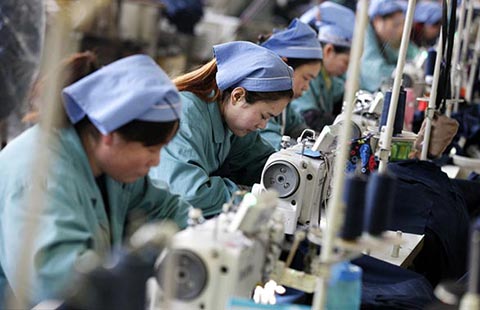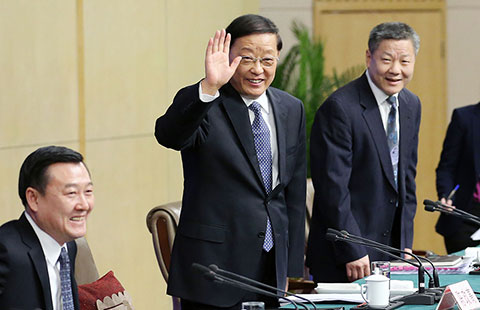Chinese industrial profits drop for 5th month: NBS
(Xinhua) Updated: 2012-09-27 11:18BEIJING -- Profits for major Chinese industrial firms continued to fall in August weighed down by sapping markets both at home and abroad, official data showed Thursday.
Profits for major industrial companies, or those with annual revenues of more than 20 million yuan ($3.15 million), fell 6.2 percent year-on-year to 381.2 billion yuan in August, marking a decline for the fifth straight month, the National Bureau of Statistics said in a statement.
The figure also represented the largest decrease among the past five months.
In the first eight months, profits for industrial firms fell 3.1 percent from a year earlier to 3.06 trillion yuan, 0.4 percentage points greater than the decrease for the first seven months.
Profits for state-run industrial enterprises, joint ventures and overseas-invested companies dropped, while private and collectively-owned firms recorded profit gains, the figures showed.
State-run firms saw profits decline 12.7 percent year on year in the first eight months. Private sector profits grew 15.1 percent.
Profits for foreign-funded companies and those from Hong Kong, Macao and Taiwan fell 12.7 percent year on year to 703.4 billion yuan.
Out of 41 industry categories, 24 reported year-on-year profit gains, while 16 saw profits fall and one saw a loss, the figures showed.
The ferrous metal sector was hit the hardest, as profits slumped by 67.4 percent year-on-year. Oil refining, coking and nuclear fuel processing companies saw profits turn into losses.
Profits in the power generation and auto manufacturing sectors, however, increased 36.5 percent and 10.8 percent, respectively.
The main business revenues of major industrial firms in the first eight months totaled 57.64 trillion yuan, up 10.2 percent from a year earlier, the figures showed.
Dropping orders from China's key trading partners, debt-crippled Europe and the slowly recovering United States, as well as equally feeble domestic demand, quickened the rate of decrease in August, analysts said.
As indicated by HSBC's recently released purchasing managers index, domestic demand remains weak and the economic downturn has continued, said Bai Pengming, a researcher at CIConsulting, a leading industry research institution in China.
The PMI data and operational difficulties for industrial enterprises will cause their profits to slide further, Bai said.
HSBC's preliminary PMI reading released last week showed that China's manufacturing activity contracted for the 11th straight month in September due to declining orders and hard-to-sell inventories.
"On one hand, industrial production costs have been on the rise and companies have oversupplied. But on the other hand, concentration in low-end production has undermined companies' pricing power and cost control, thus shrinking their profits," said Luo Zhongwei, a researcher at the Institute of Industrial Economics under the Chinese Academy of Social Sciences.
Some industrial firms have shut down part of their production as a result. Han Kai, secretary to the general manager of Shandong Huacheng Group Co, said the company's production line of engine connecting rod has operated at only 40 percent of its capacity due to a drop in orders.
Manufacturing industries, such as those producing engineering machinery, are still shrinking because of government controls over the property market, while newly-approved infrastructure projects have yet to have an effect on the market, Han said.
With economic growth hitting a three-year low of 7.6 percent in the second quarter, the Chinese government earlier this month approved dozens of infrastructure projects worth more than one trillion yuan in order to buoy the economy. The projects include highways, ports, railways, sewage networks and waste treatment plants.
But the country's external environment could deteriorate further, as some developed economies, including the United States and Japan, have adopted new easing measures to shore up growth. The moves will likely push up imported inflation, corporate financing costs and the yuan's value, which will be a blow to export-oriented firms.
Not only are orders dropping, but so are profit margins. The latest round of quantitative easing adopted by the United States will make it worse, according to a manager with a Shandong-based photovoltaic firm.
The US Fed said it will buy $40 billion in mortgage securities each month until the economy improves, while the Bank of Japan announced that it will expand its asset purchase and loan program by 10 trillion yen (about $124 billion) to boost growth.
- China's home prices continue to rise
- Lenovo reorganizes to better tackle VR and other emerging tech
- New tracing system to guarantee food safety
- Chinese shares close higher Friday
- China needs more e-bikes, not cars, former minister says
- Pet care points to a rewarding career track
- Hainan Airlines will recruit 300 foreign flight attendants
- Number of Chinese websites exceeds 4.2 million
















